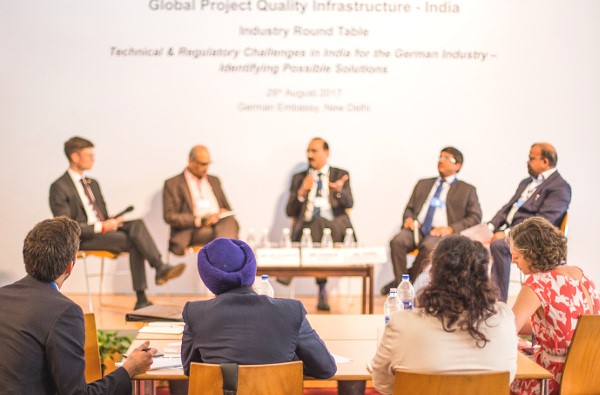Global Project Quality Infrastructure – India
Project description
Project or programme title: Global Project Quality Infrastructure – India
Commissioned by: German Federal Ministry for Economic Affairs and Energy (BMWi)
Country: India
Key political partner: Ministry of Consumer Affairs, Food & Public Distribution (MoCAF&PD)
Overall term: 2017 to 2020

Context
The safety, reliability and compatibility of products and services are among the most important quality expectations that consumers and companies can have. The system that ensures these expectations and regulatory requirements are met is called the Quality Infrastructure. To establish and implement voluntary standards and technical regulations, to conduct conformity assessments and accreditation processes, and to ensure market surveillance and legal metrology, all require the support of both public and private institutions.
Well-functioning and internationally coherent national quality infrastructures reduce the time, costs and uncertainty faced by companies participating in global markets. Divergent standards, and multiple testing and certification requirements create costs for companies and consumers alike, while often doing little to improve the quality of products.
Cooperation on Quality Infrastructure demonstrates the strong ties that exist between Germany and India. With annual bilateral trade currently standing at over EUR 17 billion, both countries have a strong interest in enhancing the quality of goods and services traded between them. There is also agreement that, especially in areas like manufacturing and digital technology, the full economic potential of their cooperation has yet to be achieved. The closer the economic partnership between India and Germany becomes, the more important it is to discuss the technical modalities of the economic exchanges.
Objective
The policy dialogue between the German Federal Ministry for Economic Affairs and Energy and its partner ministries is helping to reduce technical barriers to trade, enhance product safety and strengthen consumer protection.
Approach
The policy and technical dialogues between Germany and its partner countries involve key stakeholders on both sides, including line ministries, subordinate government institutions, industry associations and companies, as well as technical and scientific institutions.
In 2013 the Indo-German Working Group on Quality Infrastructure was established between the Indian Ministry of Consumer Affairs and Public Distribution (MoCAF&PD) and the German Federal Ministry for Economic Affairs and Energy. Since then, the topics addressed by the Working Group have been agreed upon annually. They reflect the key areas of economic relations between the two countries. The topics range from automotive engineering, machine safety, smart manufacturing, medical devices and charging stations for electric vehicles, to information technology (IT) and data protection.
The German ministry has commissioned GIZ to facilitate the implementation of the jointly agreed activities. The project supports the development of feasible solutions, in cooperation with the responsible regulators, leading to a reduction of time and effort for the industry. Activities include:
- Facilitation of the involvement of relevant stakeholders, enabling them to identify common regulatory and technical problems faced by the private sector in accessing markets,
- Support for policy-level efforts to address challenges,
- Organisation of expert workshops and conferences,
- Production of reports and studies
- Organisation of study visits to strengthen knowledge exchange and familiarise participants with new regulations and technical guidelines.
Results achieved so far
The project has organised activities to identify areas of mutual interest, which are addressed by the Indo-German Working Group on Quality Infrastructure. Among other activities, the project has organised roundtable discussions to foster exchanges of first-hand information between industry experts and Indian Government institutions. This is intended to improve the regulatory environment in India. In the roundtables, stakeholders discussed topics such as the development of harmonised standards for smart manufacturing, safety regulations for machinery, and the simplification of conformity assessment procedures in the automotive industry.
The project has also coordinated the feedback of German experts, drawing on international best practices, with respect to draft regulations in India for new conformity assessment schemes and other areas. It is keeping companies informed about recent and upcoming regulatory changes and policy developments in the country. It has also supported the involvement of industry experts in the technical committees of the Bureau of Indian Standards (BIS), as a means of actively assisting India with the development of standards in areas such as machinery safety.
An Indo-German pilot project exploring the mutual recognition of test reports has also benefited from project support. Through cooperation with Indian regulators, the project addressed the specific challenges companies have when importing products (e.g. certification of medical devices).